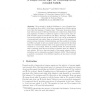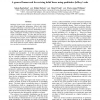127
Voted
JELIA
2010
Springer
15 years 18 days ago
2010
Springer
Stable belief sets were introduced by R. Stalnaker in the early ’80s, as a formal representation of the epistemic state for an ideal introspective agent. This notion motivated M...
118
click to vote
FUIN
2010
15 years 21 days ago
2010
Intelligent agents require methods to revise their epistemic state as they acquire new information. Jeffrey’s rule, which extends conditioning to probabilistic inputs, is appropr...
101
click to vote
FUIN
2002
15 years 1 months ago
2002
This paper deals with iterated belief change and proposes a drastic revision rule that modifies a plausibility ordering of interpretations in such a way that any world where the in...
144
click to vote
AAAI
1990
15 years 3 months ago
1990
Since knowledge bases (KBs) are usually incomplete, they should be able to provide information regarding their own incompleteness, which requires them to introspect on what they k...
123
Voted
FLAIRS
2007
15 years 4 months ago
2007
Information is indispensable in preparing economic decisions purposefully. In this paper knowledge is represented by a probability distribution. Knowledge acquisition is realized ...
117
click to vote
ECAI
2000
Springer
15 years 6 months ago
2000
Springer
Abstract. We propose a very general syntactical notion of epistemic state and a compact axiomatization for iterated revision when the new information is an epistemic state. We set ...
131
Voted
ECSQARU
2009
Springer
15 years 6 months ago
2009
Springer
Abstract. Even though in Artificial Intelligence, a set of classical logical formulae is often called a belief base, reasoning about beliefs requires more than the language of cla...
114
Voted
ISMIS
2009
Springer
15 years 8 months ago
2009
Springer
Intelligent agents require methods to revise their epistemic state as they acquire new information. Jeffrey’s rule, which extends conditioning to uncertain inputs, is used to re...


